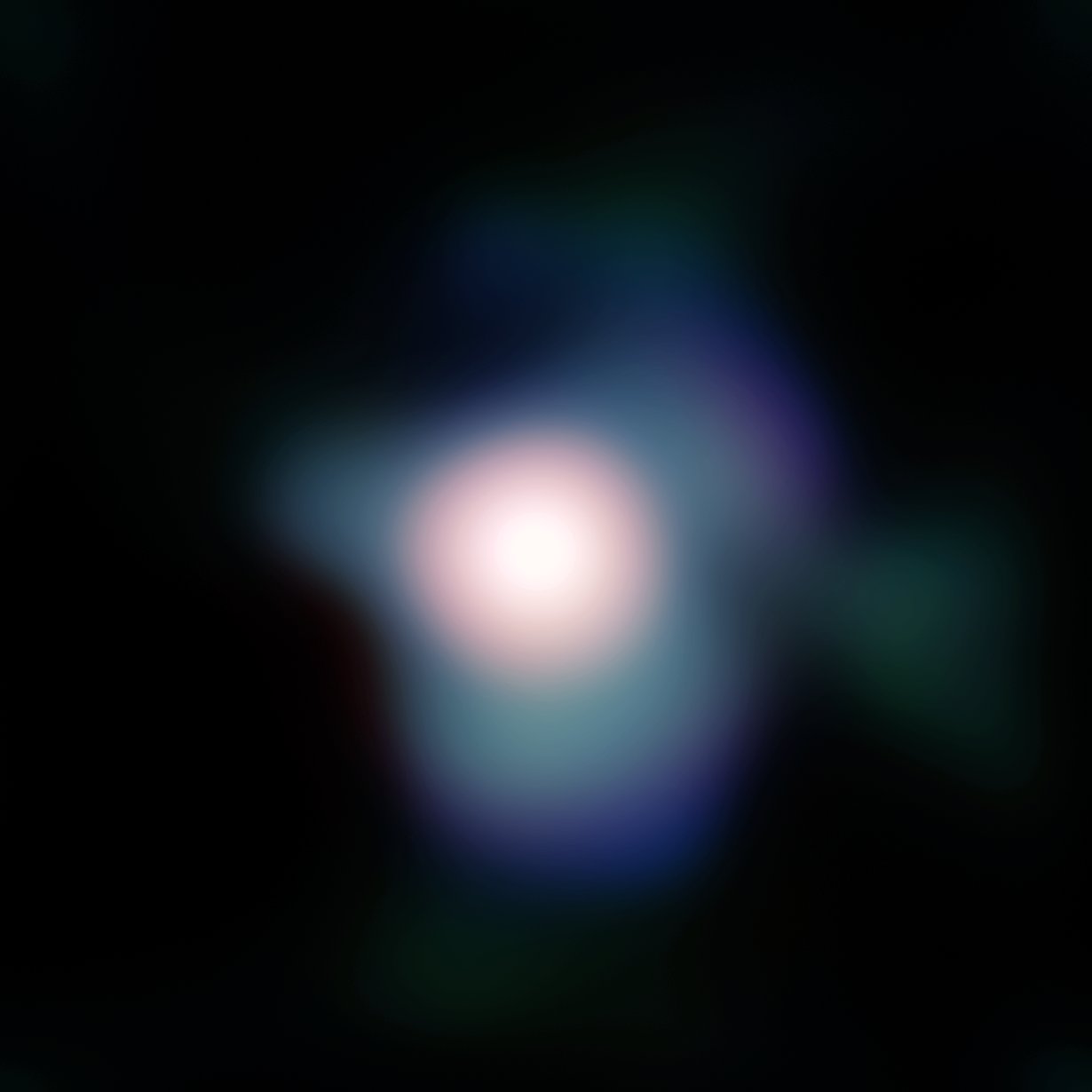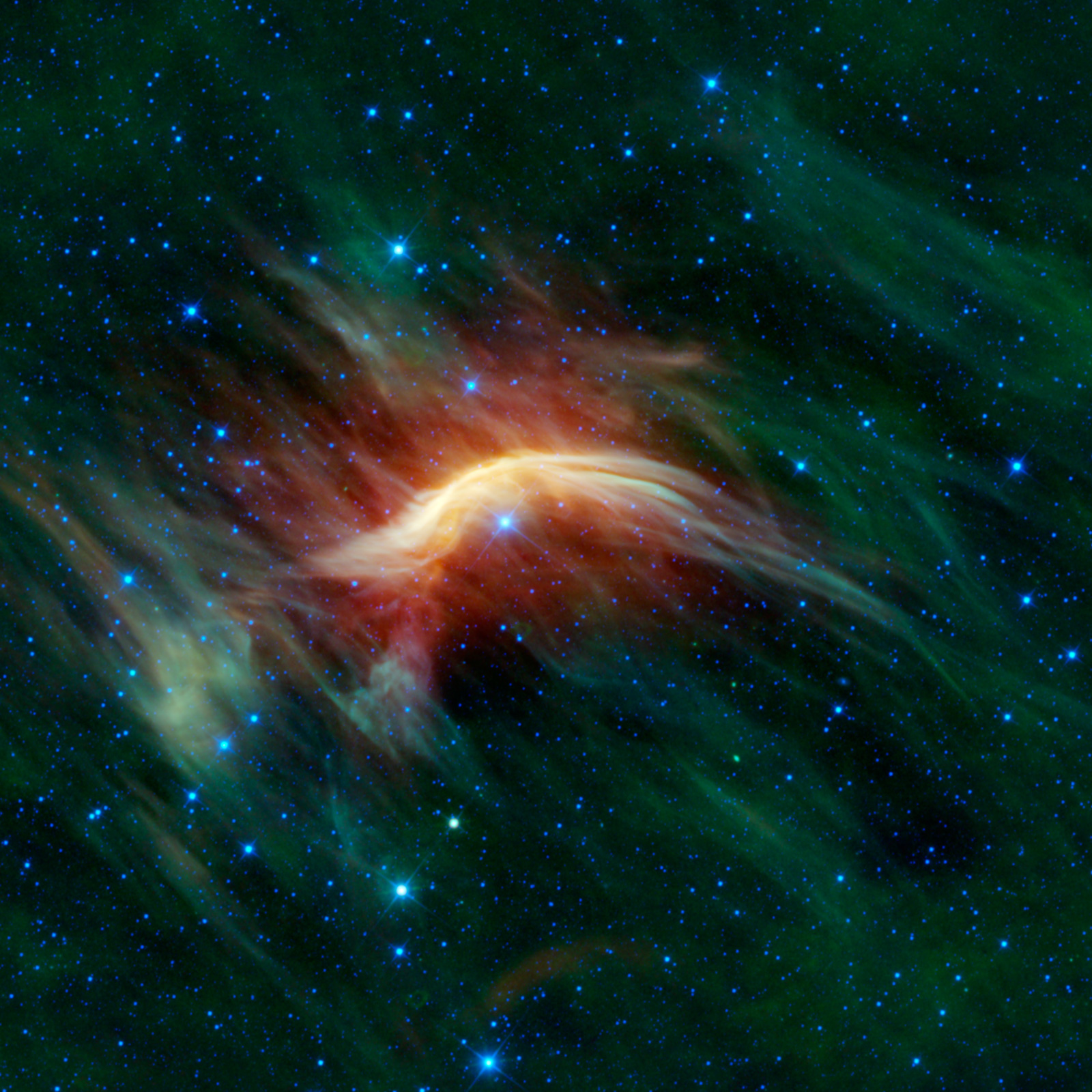Page 1 of 3
APOD: Zeta Oph: Runaway Star (2011 Feb 04)
Posted: Fri Feb 04, 2011 5:06 am
by APOD Robot
 Zeta Oph: Runaway Star
Explanation:
Zeta Oph: Runaway Star
Explanation: Like a ship plowing through cosmic seas,
runaway star Zeta Ophiuchi produces the arcing interstellar bow wave or bow shock seen in this
stunning infrared portrait from the WISE spacecraft. In the false-color view, bluish Zeta Oph, a star about 20 times more massive than the Sun, lies near the center of the frame, moving toward the top at 24 kilometers per
second. Its strong stellar wind precedes it, compressing and heating the dusty
interstellar material and shaping the curved shock front. Around it are clouds of relatively undisturbed material. What set this star in motion? Zeta Oph was likely once a member of a
binary star system, its companion star was more massive and hence
shorter lived. When the companion
exploded as a supernova catastrophically losing mass, Zeta Oph was flung out of the system. About 460 light-years away, Zeta Oph is 65,000 times more luminous than the Sun and would be one of the brighter stars in the sky if it weren't surrounded by obscuring dust. The
WISE image spans about 1.5 degrees or 12 light-years at the estimated distance of
Zeta Ophiuchi.
[/b]
Re: APOD: Zeta Oph: Runaway Star (2011 Feb 04)
Posted: Fri Feb 04, 2011 5:12 am
by bystander
Re: APOD: Zeta Oph: Runaway Star (2011 Feb 04)
Posted: Fri Feb 04, 2011 11:36 am
by GoBears
It's too bad we use the phrase "false color" for images like this. The colors aren't really false, but shifted so we can see wavelengths we can't naturally see.
I know that for most of us this will sem a trivial distinction, but I recently attended a focus group on astrophotography and one of the participants said she didn't trust these photos because they were "false." I guess she thought this meant they were PhotoShopped or otherwise altered.
But I think false color photos should remind us that we naturally perceive only a small portion of the electromagnetic spectrum, and when we SETI or consider possible exobiology, we should consider all possibilities. We now know that birds can see well into the ultraviolet and snakes can perceive infrared. Who knows, there may be beings out there (on Kepler's 1,200 new planets?) who communicate in x-rays, pheremones or ULF radiation. SciFi writers usually imagine aliens who speak using vibrating air and see with two eyes. I suspect the ultimate truth will be far more surprising.
- sent from my Palm Pre
Re: APOD: Zeta Oph: Runaway Star (2011 Feb 04)
Posted: Fri Feb 04, 2011 12:12 pm
by Ann
I know that for most of us this will sem a trivial distinction, but I recently attended a focus group on astrophotography and one of the participants said she didn't trust these photos because they were "false."
It wasn't me!
Ann
Re: APOD: Zeta Oph: Runaway Star (2011 Feb 04)
Posted: Fri Feb 04, 2011 12:17 pm
by nstahl
This is a great APOD. I see from
Wikipedia that WISE is retired now, like some of us, but had an illustrious and highly varied career. A space telescope of many hats.
Re: APOD: Zeta Oph: Runaway Star (2011 Feb 04)
Posted: Fri Feb 04, 2011 12:27 pm
by Ann
On the other hand, speaking about false colors, many people seem to have no problems with objects that are shown as redder than they are in the visual part of the spectrum. My impression is that many people react more negatively to objects that are shown as bluer than we "know" that they are. For example, this is an image of red supergiant star Betelgeuse which looks suspiciously blue here:
If this image of Betelgeuse was shown with no comment on the color of the star, I think that many people would begin to wonder. Surely Betelgeuse isn't that blue?
Similarly, we very often see photographs of the Sun where our star looks deeply orange, and not many people seem to mind:

Occasionally the Sun is shown as blue, which, I think, would seem unnatural to most people:

But when it comes to the Sun's "true color", the orange version of the Sun is only marginally better than the blue one. The main difference would seem to be many people's lower tolerance for "false blue color" than for "false red or orange color".
Ann
Re: APOD: Zeta Oph: Runaway Star (2011 Feb 04)
Posted: Fri Feb 04, 2011 12:54 pm
by nstahl
A star should be hot. We (falsely) think of blue as a cool color, probably because of blue water or blue sky. Or maybe even blue ice.
Re: APOD: Zeta Oph: Runaway Star (2011 Feb 04)
Posted: Fri Feb 04, 2011 2:03 pm
by orin stepanek
I like the color shown; and I have no trouble with the colors APOD uses! It is probably why I come to view APOD every day. Today's is really stunning.
Re: APOD: Zeta Oph: Runaway Star (2011 Feb 04)
Posted: Fri Feb 04, 2011 2:32 pm
by rstevenson
I often turn down the saturation on colourful APODs and other images that I save for my use as a desktop image. In this case I turned it down 30%, which yielded a much more comfortable level of colour for me. But of course it's just wallpaper now; it's lost some of the scientific value which those colours conveyed. And with that in mind, I'd have to say I agree that the phrase "false colour" is unfortunate and perhaps should be retired in favour of something more positive -- perhaps "scientific colour"?
Rob
Re: APOD: Zeta Oph: Runaway Star (2011 Feb 04)
Posted: Fri Feb 04, 2011 3:13 pm
by kgrentzer
Zeta Oph is travelling at 24Kilometers per SECOND. Where is it going and why does it not hit any thing?
KAGrentzer
Re: APOD: Zeta Oph: Runaway Star (2011 Feb 04)
Posted: Fri Feb 04, 2011 3:39 pm
by neufer
kgrentzer wrote:
Zeta Oph is traveling at 24Kilometers per SECOND.
Where is it going and why does it not hit any thing?
Its "solar wind" is hitting something..the gas & dust shown in the APOD.
You are traveling at 30Kilometers per SECOND in orbit around the sun.
Where are you going and why don't you hit any thing

Re: APOD: Zeta Oph: Runaway Star (2011 Feb 04)
Posted: Fri Feb 04, 2011 4:25 pm
by zbvhs
The 24 km/sec is what's called Proper Motion, correct? Have ways been devised to measure Proper Motion directly without having to track displacement over time? How exactly do we know the star is moving 24 km/sec toward the top of the view?
Re: APOD: Zeta Oph: Runaway Star (2011 Feb 04)
Posted: Fri Feb 04, 2011 4:29 pm
by ooddiinn
"24 kilometers per second"!
Anybody know the escape velocity from the galaxy around these parts?
Re: APOD: Zeta Oph: Runaway Star (2011 Feb 04)
Posted: Fri Feb 04, 2011 5:10 pm
by bystander
Ann wrote:... we very often see photographs of the Sun where our star looks deeply orange, and not many people seem to mind:
Occasionally the Sun is shown as blue, which, I think, would seem unnatural to most people:
But when it comes to the Sun's "true color", the orange version of the Sun is only marginally better than the blue one.
The main difference would seem to be many people's lower tolerance for "false blue color" than for "false red or orange color".
As both images are of wavelengths we cannot see anyway, I hardly think the color much matters, neither can ever be
"true color".
Such is the case with today's APOD. WISE is (was) an infrared instrument. If shown in
"true color", it would be rather uninteresting.
Re: APOD: Zeta Oph: Runaway Star (2011 Feb 04)
Posted: Fri Feb 04, 2011 5:58 pm
by Ann
nstahl wrote:A star should be hot. We (falsely) think of blue as a cool color, probably because of blue water or blue sky. Or maybe even blue ice.
That is very true, nstahl.
On the other hand, science should be about enlightening people, not about flattering their misconceptions. Why should science encourage the mistaken idea that blue is a cooler color than red? Suppose we tell a group of average people that we need to construct an extremely powerful laser, and the power of the laser will depend on the color we choose for the light it will produce. All other factors being equal - that is, we assume that it is similarly easy or hard to produce lasers of any color - what color should we choose for our super-powerful laser, red or blue? My guess is that most people would vote for a red color, since red would seem to be a more "intense" and "energetic" color to them than blue.
Of course, it is possible that people would vote for a green laser instead, since green lasers are known for being very intense and powerful. But my guess is that most people wouldn't realize that a blue laser would naturally be even more powerful than a green one.
Personally I come very close to taking offense when the ultraviolet light from the Sun is shown in orange. I think that the choice of orange color to symbolize ultraviolet is nothing but, as I said, the flattering of public misconceptions.
Ann
Re: APOD: Zeta Oph: Runaway Star (2011 Feb 04)
Posted: Fri Feb 04, 2011 6:41 pm
by neufer
bystander wrote:Ann wrote:... we very often see photographs of the Sun where our star looks deeply orange, and not many people seem to mind:
Occasionally the Sun is shown as blue, which, I think, would seem unnatural to most people:
But when it comes to the Sun's "true color", the orange version of the Sun is only marginally better than the blue one.
The main difference would seem to be many people's lower tolerance for "false blue color" than for "false red or orange color".
As both images are of wavelengths we cannot see anyway, I hardly think the color much matters, neither can ever be
"true color".
Such is the case with today's APOD. WISE is (was) an infrared instrument. If shown in
"true color", it would be rather uninteresting.
Yes, but, at least, folks in Oklahoma could then put their hands up to the screen to warm them.
Re: APOD: Zeta Oph: Runaway Star (2011 Feb 04)
Posted: Fri Feb 04, 2011 7:38 pm
by NoelC
Allow me to add a dissenting voice:
I think it's highly appropriate to note that the image is in "false color", because people can be mislead if it's NOT stated! They might think that if they simply look in the right place - or through the right telescope - this is what they'll see. Saying it's in "false color" encourages people to think about the spectrum, and how we see. I've seen this happen first-hand. So it's not clear what the "better" group of lay people is to satisfy or mislead.
But not stating it leaves INFORMED people wondering what's up. Information trumps lack of information.
I STRONGLY support the use of the term "false color" when the colors do not represent the visual spectrum accurately.
-Noel
Re: APOD: Zeta Oph: Runaway Star (2011 Feb 04)
Posted: Fri Feb 04, 2011 7:47 pm
by neufer

Runaway Star: Tammy Faye Bakker ("true color")
NoelC wrote:
Allow me to add a dissenting voice:
I think it's highly appropriate to note that the image is in "false color", because people can be mislead if it's NOT stated! They might think that if they simply look in the right place - or through the right telescope - this is what they'll see. Saying it's in "false color" encourages people to think about the spectrum, and how we see. I've seen this happen first-hand. So it's not clear what the "better" group of people is to satisfy.
But not stating it leaves INFORMED people wondering what's up.
I STRONGLY support the use of the term "false color" when the colors do not represent the visual spectrum accurately. -Noel
Re: APOD: Zeta Oph: Runaway Star (2011 Feb 04)
Posted: Fri Feb 04, 2011 7:59 pm
by Sam
On the thread
http://asterisk.apod.com/vie ... 29&t=22712 , neufer pointed out that the red bow shock is cooler than the green interstellar dust:
neufer wrote:bystander wrote:Zeta Ophiuchi: A runaway star plowing through space dust
...
The colors used in this image represent specific wavelengths of infrared light. Blue and cyan (blue-green) represent light emitted at wavelengths of 3.4 and 4.6 microns, which is predominantly from stars. Green and red represent light from 12 and 22 microns, respectively, which is mostly emitted by dust.
Redder (22 microns) means cooler than green (12 microns). The compressed bow shock is the cooler gas.

Just wondering if there's an explanation for that?
Sam
Re: APOD: Zeta Oph: Runaway Star (2011 Feb 04)
Posted: Fri Feb 04, 2011 8:03 pm
by NoelC
LOL, neufer, but it helps to make a point:
If we remap Tammy Faye's colors to different parts of the visual spectrum, do we not find it visually disruptive? Possibly even offensive?

Not knowing this was done for a purpose (i.e., to make a particular point), one might think that it was rather childish and tasteless.
Why, then, is it a stretch to think there are people offended by astronomical objects being treated in the same way?
In my opinion it could be called "remapped color" or "assigned color" or whatever if the word "false" is bothering people, but
wording absolutely needs to be included to indicate that the color isn't intended to represent the object via the visual spectrum.
-Noel
Re: APOD: Zeta Oph: Runaway Star (2011 Feb 04)
Posted: Fri Feb 04, 2011 8:07 pm
by owlice
You're offended by it?
Well!! I'm offended by your taking offense!
So there!!
Re: APOD: Zeta Oph: Runaway Star (2011 Feb 04)
Posted: Fri Feb 04, 2011 8:13 pm
by NoelC
Made ya think about it, though!

-Noel
Re: APOD: Zeta Oph: Runaway Star (2011 Feb 04)
Posted: Fri Feb 04, 2011 8:33 pm
by hstarbuck
Could one extrapolate temperature from these colors and the densities?
http://wise.ssl.berkeley.edu/gallery_zeta_ophiuchi.html wrote: The colors used in this image represent specific wavelengths of infrared light. Blue and cyan (blue-green) represent light emitted at wavelengths of 3.4 and 4.6 microns, which is predominantly from stars. Green and red represent light from 12 and 22 microns, respectively, which is mostly emitted by dust.
I think the green and red are what we would consider "heat", but the other colors probably have more energy per particle (or at least per photon emitted). I would still think that the "warmest" areas are in the bow shock and nearer to the star.
BTW--very aesthetically pleasing to me.
Re: APOD: Zeta Oph: Runaway Star (2011 Feb 04)
Posted: Fri Feb 04, 2011 8:38 pm
by owlice
Noel,

And no, you didn't make me think about it, other than, "Oh, carp; not again." (The whole color thing...) I know some people don't like colors being used to demonstrate science rather than something else, because they keep saying so, but to what end, I really don't know. Saying so isn't going to stop the science from being done (thank goodness).
There are so many other things in the world to be
offended about; I just can't see being offended because scientific images are used for science and thus are colored accordingly. I don't get that at all; obviously, this is my failing.
Re: APOD: Zeta Oph: Runaway Star (2011 Feb 04)
Posted: Fri Feb 04, 2011 8:47 pm
by bystander
neufer wrote:Yes, but, at least, folks in Oklahoma could then put their hands up to the screen to warm them.
I don't think my screen can render infrared faithfully enough to keep any thing warm.
neufer wrote:Runaway Star: Tammy Faye Baker ("true color")
I'm sorry, I can't see anything
true in that picture.
Are you sure it's even Tammy Faye under all that makeup?
NoelC wrote:Allow me to add a dissenting voice:
I think it's highly appropriate to note that the image is in "false color", because people can be mislead if it's NOT stated! They might think that if they simply look in the right place - or through the right telescope - this is what they'll see. Saying it's in "false color" encourages people to think about the spectrum, and how we see. I've seen this happen first-hand. So it's not clear what the "better" group of lay people is to satisfy or mislead.
But not stating it leaves INFORMED people wondering what's up. Information trumps lack of information.
I STRONGLY support the use of the term "false color" when the colors do not represent the visual spectrum accurately.
I'm not sure that's dissenting. I don't think you will find any argument that whatever color mapping was used is essential in the interpretation of the image, though not necessarily in the appreciation of it. Today's APOD is amazingly artistic, above and beyond the scientific merit of it.
 Zeta Oph: Runaway Star
Zeta Oph: Runaway Star




